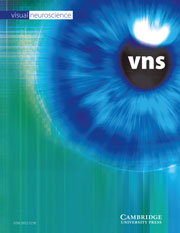Article contents
Serotonin receptors modulate rod signals: A neuropharmacological comparison of light- and dark-adapted retinas
Published online by Cambridge University Press: 01 May 1998
Abstract
Previous physiological studies have shown that serotonin (5-HT) reciprocally modulates ON and OFF channels in the mammalian retina. This study was undertaken to determine if the serotoninergic system is exclusively associated with the rod pathway. We tested drugs specific to 5-HT3 receptor, a serotonin-gated ion channel, in both dark- and light-adapted retina. Consistent with previous studies, we demonstrated that 5-HT3 receptors modulate the light-evoked responses of ganglion cells in the dark-adapted state. Moreover, we have extended these prior studies and shown that activation of the 5-HT3 receptor is capable of completely blocking the light-evoked response of OFF-center cells whereas inactivation of the 5-HT3 receptor is capable of completely blocking the light-evoked responses of ON-center cells. In contrast, in light-adapted retinae, serotonin agents failed to have any effect on retinal processing. These data suggest that the serotoninergic system in retina is (1) specifically associated with rod-related pathways; and (2) exerts a powerful modulatory force over information transfer in the retina. Together these observations suggests that serotonin plays an important physiological role in modulating retinal processing.
- Type
- Research Article
- Information
- Copyright
- 1998 Cambridge University Press
- 9
- Cited by


